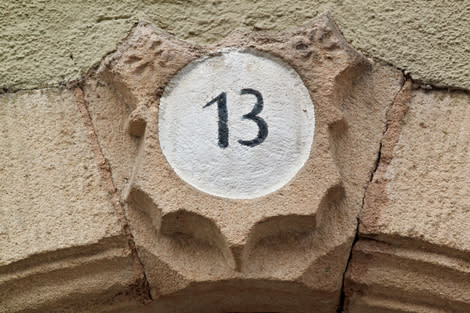Friday the 13th Vs. Martes 13

I'm willing to bet that no matter how modern you consider yourself to be, you have "knocked on wood" or touched a Buddha's belly to avoid bad luck. And while fairly common, not all superstitions are created equal. In this country, the superstitions we share may have more than one version depending on a person's given culture or background. Take for example Friday the 13th; while Americans consider Friday as the day to avoid, Hispanics shiver at having to go out on a Martes 13 (or Tuesday the 13th). Cross your fingers and let's wish for the best as we take a look at the possible sources for our fear of 13 and how superstitions are interpreted around the world.
The story behind 13
There are a number of instances in lore and literature that have made 13 the number to avoid. In the Last Supper, Judas Iscariot, the odd thirteenth man, betrayed Jesus. In Cabbala and in Nordic folklore there are 13 bad spirits, while in the Tarot the number refers to death; in the Bible, Revelation Chapter 13 speaks about the Antichrist or the Beast.
People who fear this number to the point of affliction are said to suffer from triskaidekaphobia. And, as you may have noticed, this superstition has led buildings to avoid numbering any floor as 13 and kept airlines from including a thirteenth row.
Friday vs. Martes
WHY FRIDAY? It has been considered a day of bad luck since 14th century's Canterbury Tales. "Black Friday" has been associated with stock market crashes and a number of other disasters since the 1800's; the day is also considered an unlucky day because, according to Christian tradition, it was the day Jesus was crucified.
WHY MARTES (TUESDAY)? The Spanish name for the third day of the week comes from Mars, the Roman god of war. This god was related to everything that had to do with energy, tension and violence. In Greece, Spain and Latin America, Tuesday the 13th is the day of bad luck. So much so that in Spanish-speaking countries there's a little refrain warning you what not to do on that day:
En 13 y martes, ni te cases ni te embarques, ni de tu familia te apartes.
(On Tuesday the 13th don't get married, don't travel and don't be away from family)
Superstitions we share
Latin and Anglo cultures share quite a bit when it comes to superstitions. Here are some of the most popular:
SUPERSTITION | LUCK | BELIEF |
Seeing a black cat | Bad luck | The devil reincarnated (Catholic tradition) |
Horseshoe on doorpost | Good luck | Protects against spells (Greek lore) |
Breaking a mirror | Bad luck | It brings seven years of bad luck |
Finding a 4-leaf clover | Good luck | Foretells the future (Druids) |
Knocking on wood | Good luck | Reminder of Jesus' cross |
(Courtesy: Supersticiones más comunes)
Quirky Latin American superstitions
ARGENTINA: If a man touches his left testicle, it will bring him good luck.
PERU: Eating lentils on Mondays brings luck and health.
URUGUAY: If someone drinks from the same glass as you, they will know all your secrets.
DOMINICAN REPUBLIC and PUERTO RICO: If a woman allows a broom to sweep her feet, she'll end up a spinster or will marry an old man.
MEXICO: If you hear an owl's hoot, it means someone dear to you will die.
HONDURAS: If you get a haircut on a full moon, it will grow back faster.
Related stories:
Surprising truths behind wedding superstitions
Black cats and birds: all about superstitions
The "how-to-get-a-husband" superstitions
For content that speaks to you, visit Shine Latina.